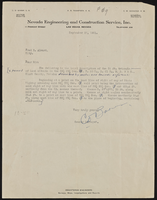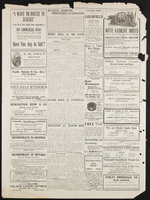Search the Special Collections and Archives Portal
Search Results
Bill Willard Papers
Identifier
Abstract
This collection is comprised of the personal papers of noted Las Vegas entertainment writer, producer, and critic Bill Willard, which date from 1887 to 1999. It contains material on his father's theater and political involvements as well as Willard's early childhood and high school years. His time in the United States Army is chronicled by the editorials and correspondence he wrote. His papers trace his continued involvement in writing, entertainment, and art which culminated in his direction of the Arnold Shaw Popular Music Research Center. The collection also includes pictures of his artwork, articles he wrote for various newspapers and magazines, scripts, skits, jokes, awards, over 700 audio cassette recorded interviews done for the "Rap with the Artist" series, and personal memorabilia.
Archival Collection

Tiza Stewart real estate documents
Date
Archival Collection
Description
Tiza Stewart real estate documents
Text

Meeting minutes for Consolidated Student Senate, University of Nevada, Las Vegas, April 03, 1979
Date
Archival Collection
Description
Text

Brittany Castrejon oral history interview: transcript
Date
Archival Collection
Description
Oral history interview with Brittany Castrejon conducted by Claytee D. White and Barbara Tabach on November 9, 2017 for the Remembering 1 October Oral History Project. In this interview, Brittany Castrejon details her experiences during the evening of the 2017 mass shooting in Las Vegas, Nevada. She describes the Route 91 Harvest Festival set-up and details the events of that night, which she experienced alongside her 14-year-old cousin and a few friends. Castrejon tells her story of trying to find safety from the chaos during the entire ordeal, eventually finding refuge for the remainder of the night at the Tropicana hotel. She ends the interview by discussing her adjustment to life after the shooting and her post-traumatic stress disorder, as well as what she has learned from the experience.
Text
Clayton Anderson (Elko County School District) oral history interview conducted by Magdalena Martinez and Elia Del Carmen Solano-Patricio: transcript
Date
Archival Collection
Description
From the Lincy Institute "Perspectives from the COVID-19 Pandemic" Oral History Project (MS-01178) -- Education sector interviews file.
Text
Vera Moore (True Beginnings/Divinity House) oral history interview conducted by Kelliann Beavers and Elia Del Carmen Solano-Patricio: transcript
Date
Archival Collection
Description
From the Lincy Institute "Perspectives from the COVID-19 Pandemic" Oral History Project (MS-01178) -- Community organization interviews file.
Text

Louis Yoxen interview, 2003: transcript
Date
Archival Collection
Description
Yoxen begins her interview by discussing how she first arrived in Las Vegas, Nevada to work for the U.S. State Department in the 1950s. She then describes her childhood in Alabama, competing in the Miss America pageant, and her life in Miami, Florida. Yoxen also discusses living in North Africa and Berlin, Germany while working for the State Department as a clerk. She then talks about moving around with her sister and her family, and eventually coming to Las Vegas. She describes what Las Vegas was like in the 1950s. Yoxen ends her interview with a discussion on her family, her husband's work, and their recreational activities.
Text
Maxine and Jack Cason oral history interview: transcript
Date
Archival Collection
Description
Oral history interview with Maxine and Jack Cason conducted by Claytee D. White and Stefani Evans on September 22, 1016 for the Building Las Vegas Oral History Project. In this interview, Jack discusses his early life in Oklahoma and arriving to Las Vegas, Nevada in 1950. He recalls the formation of Saveway Super Service, Philips 66 service stations, the competition in the fuel industry, and the opening of the first Rebel service station. Jack talks about fuel terminals, fuel bulk plants, and becoming one of the largest fuel providers in southern Nevada. Later, Maxine and Jack talk about supporting local sports organizations. Lastly, Jack discusses his involvement in the University of Nevada Las Vegas (UNLV) Athletics Department, and being inducted into the UNLV Sports Hall of Fame.
Text

Antioco Carrillo interview, 2019: transcript
Date
Archival Collection
Description
Interviewed by Monserrath Hernández, Rodrigo Vazquez, and Laurents Benitez-Bañuelos. A native of Jalisco, Mexico, moved to Las Vegas when he was about 20-year old in 1987. Attended CSN and UNLV. His history with Las Vegas is embedded in the 1980s Las Vegas gay scene and education for AIDS. He is and activist and the Executive Director of Aid for AIDS of Nevada. He and Theodore Small are the first same-sex marriage in Nevada.
Text

